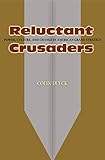Reluctant Crusaders : Power, Culture, and Change in American Grand Strategy / Colin Dueck.
Material type: TextPublisher: Princeton, NJ : Princeton University Press, [2008]Copyright date: ©2006Edition: Course BookDescription: 1 online resource (240 p.)Content type:
TextPublisher: Princeton, NJ : Princeton University Press, [2008]Copyright date: ©2006Edition: Course BookDescription: 1 online resource (240 p.)Content type: - 9780691136257
- 9781400827220
- 327.73/009/0511 22
- E183.7 .D74 2006
- online - DeGruyter
- Issued also in print.
| Item type | Current library | Call number | URL | Status | Notes | Barcode | |
|---|---|---|---|---|---|---|---|
 eBook
eBook
|
Biblioteca "Angelicum" Pont. Univ. S.Tommaso d'Aquino Nuvola online | online - DeGruyter (Browse shelf(Opens below)) | Online access | Not for loan (Accesso limitato) | Accesso per gli utenti autorizzati / Access for authorized users | (dgr)9781400827220 |
Frontmatter -- Contents -- Acknowledgments -- Introduction. Change and Continuity in American Grand Strategy -- Chapter 1. Power, Culture, and Grand Strategy -- Chapter 2. Strategic Culture and Strategic Adjustment in the United States -- Chapter 3. The Lost Alliance: Ideas and Alternatives in American Grand Strategy, 1918-1921 -- Chapter 4. Conceiving Containment: Ideas and Alternatives in American Grand Strategy, 1945-1951 -- Chapter 5. Hegemony on the Cheap: Ideas and Alternatives in American Grand Strategy, 1992-2000 -- Conclusion. The American Strategic Dilemma -- Notes -- Index
restricted access online access with authorization star
http://purl.org/coar/access_right/c_16ec
In Reluctant Crusaders, Colin Dueck examines patterns of change and continuity in American foreign policy strategy by looking at four major turning points: the periods following World War I, World War II, the Cold War, and the 9/11 terrorist attacks. He shows how American cultural assumptions regarding liberal foreign policy goals, together with international pressures, have acted to push and pull U.S. policy in competing directions over time. The result is a book that combines an appreciation for the role of both power and culture in international affairs. The centerpiece of Dueck's book is his discussion of America's "grand strategy"--the identification and promotion of national goals overseas in the face of limited resources and potential resistance. One of the common criticisms of the Bush administration's grand strategy is that it has turned its back on a long-standing tradition of liberal internationalism in foreign affairs. But Dueck argues that these criticisms misinterpret America's liberal internationalist tradition. In reality, Bush's grand strategy since 9/11 has been heavily influenced by traditional American foreign policy assumptions. While liberal internationalists argue that the United States should promote an international system characterized by democratic governments and open markets, Dueck contends, these same internationalists tend to define American interests in broad, expansive, and idealistic terms, without always admitting the necessary costs and risks of such a grand vision. The outcome is often sweeping goals, pursued by disproportionately limited means.
Issued also in print.
Mode of access: Internet via World Wide Web.
In English.
Description based on online resource; title from PDF title page (publisher's Web site, viewed 30. Aug 2021)


